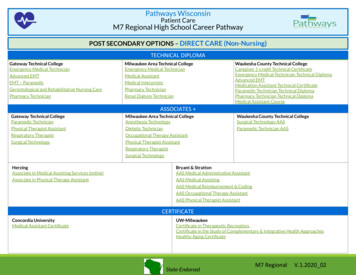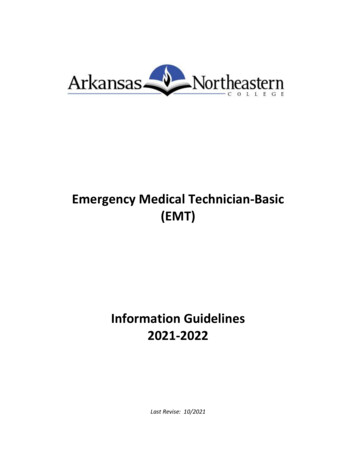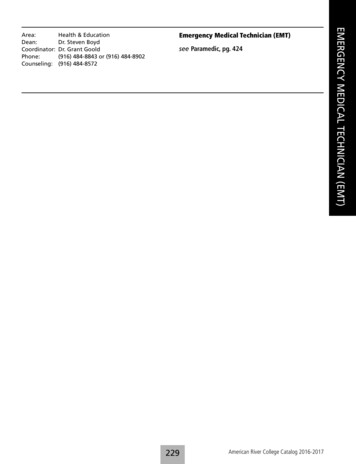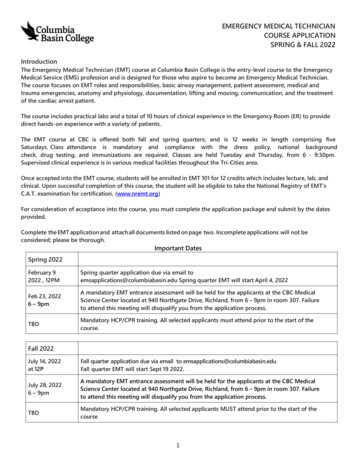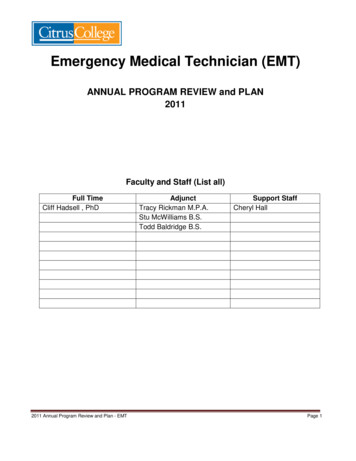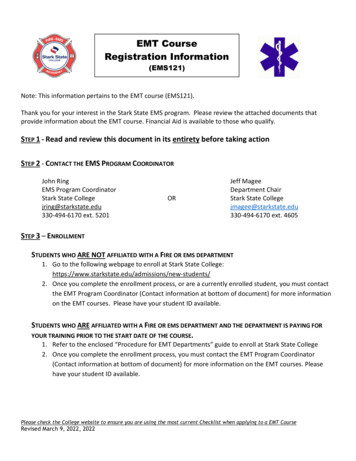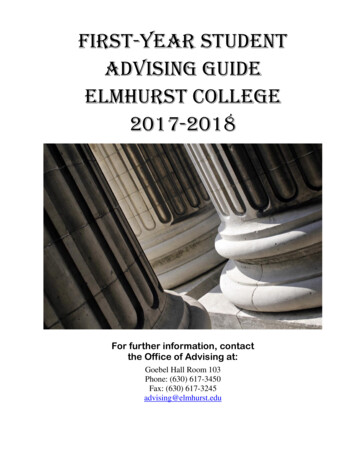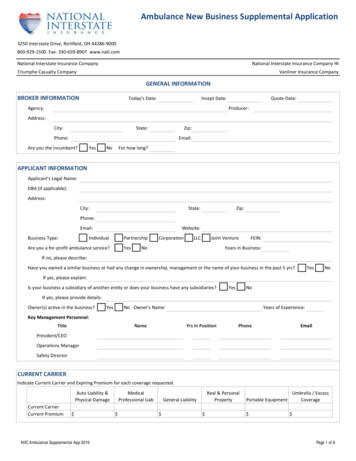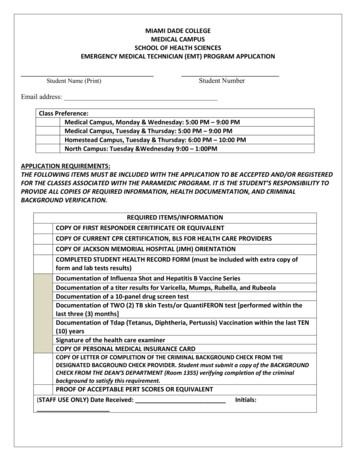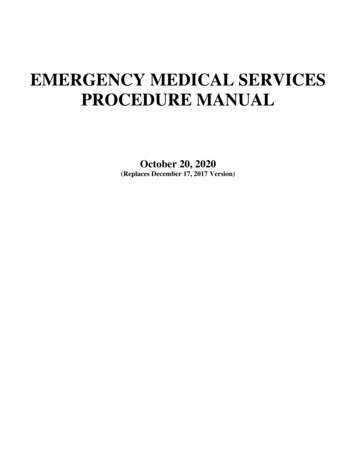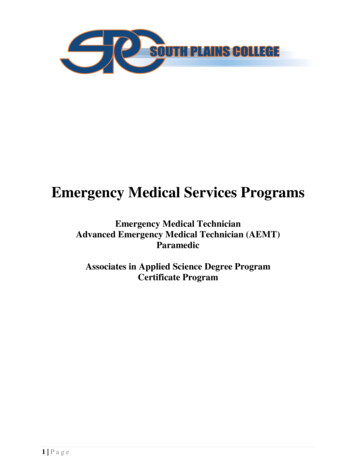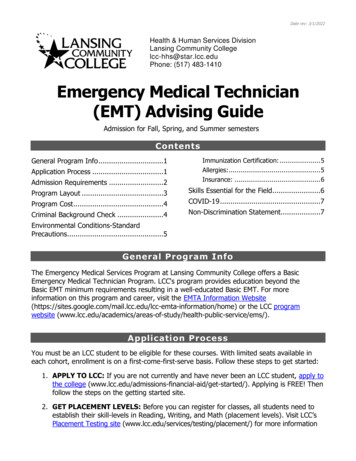
Transcription
Date rev: 3/1/2022Health & Human Services DivisionLansing Community Collegelcc-hhs@star.lcc.eduPhone: (517) 483-1410Emergency Medical Technician(EMT) Advising GuideAdmission for Fall, Spring, and Summer semestersContentsGeneral Program Info .1Application Process .1Admission Requirements .2Program Layout .3Program Cost .4Criminal Background Check .4Immunization Certification: . 5Allergies: . 5Insurance: . 6Skills Essential for the Field.6COVID-19 .7Non-Discrimination Statement.7Environmental Conditions-StandardPrecautions.5General Program InfoThe Emergency Medical Services Program at Lansing Community College offers a BasicEmergency Medical Technician Program. LCC's program provides education beyond theBasic EMT minimum requirements resulting in a well-educated Basic EMT. For moreinformation on this program and career, visit the EMTA Information emta-information/home) or the LCC programwebsite c-service/ems/).Application ProcessYou must be an LCC student to be eligible for these courses. With limited seats available ineach cohort, enrollment is on a first-come-first-serve basis. Follow these steps to get started:1. APPLY TO LCC: If you are not currently and have never been an LCC student, apply tothe college ). Applying is FREE! Thenfollow the steps on the getting started site.2. GET PLACEMENT LEVELS: Before you can register for classes, all students need toestablish their skill-levels in Reading, Writing, and Math (placement levels). Visit LCC’sPlacement Testing site (www.lcc.edu/services/testing/placement/) for more information
a. Current LCC students can find their placement levels by logging into theirMyLCC account (https://my.lcc.edu/) and looking in the “Profile” tab.b. First-time college students can get placement levels by taking Assessmenttests in Reading, Writing and Math. Tests are free to complete. They can also getplacement levels based off of their High School GPA, AP courses, or ACT / SATscores. For more information, check out the Assessment Waiver ive-testing.html).*First-time college students will need to attend a College orientation beforeenrolling in classes. More information is on the Getting Started sions/first-time.html).c. Transfer students may be able to receive placement levels based on coursescompleted at another college. To do this, attach copies of your transcript(s) tothe Assessment Waiver Form esting.html). Know that the waiver form does not grant transfer credit. Officialtranscripts must be sent directly to LCC’s Registrars Office for transfer credit tobe awarded.3. SUBMIT EMT APPLICATION: The most recent application can be found at thebottom of the Basic-EMT Overview Page on the Main LCC l).4. ATTEND A MANDATORY EMS PROGRAM ORIENTATION:Attendance at a mandatory EMS orientation is required prior to entering the EMTcourses. This is a four-hour session that takes place on a morning or afternoon prior toclasses beginning for the semester.*Check out LCC’s Academic Calendars for important dates(www.lcc.edu/academics/calendars/).Admission Requirements*Applicants must meet all of the following criteria to be eligible to enroll in EMT.ADMISSION REQUIREMENTSMust be 17 ½ years old to take the National Registry Exam and 18 years old toreceive the EMT license.Reading Level 5 (See application process – page 1)Writing Level 6 (See application process – page 1)EMT Application Completed*Ideally application should be submitted at least 2 weeks prior to the start of the semesterPage 2
Program LayoutThe EMS program offers day, evening, and summer accelerated cohorts. With limited seatsavailable in each cohort, enrollment is on a first-come-first-serve basis.EMSCohortNumber ofStudentsAdmittedAnnuallySemesterStart DateProgramDuration(once admitted)Day24Fall andSpring1 Semester*Some Lecturesare HybridEvening24Fall2 semesters*Some Lecturesare HybridAccelerated24Summer1 Semester*Some Lecturesare -FaceDAY COHORT: This option allows completion of the full EMT program, including EMS agencyride-alongs and hospital clinical, within one semester. Students may choose either fall or springsemester with courses running 16 weeks. The student must enroll in EMTA 101, EMTA 102,EMTA 103, EMTA 104 and EMTA 112 concurrently. EMTA 101 and EMTA 102 must besuccessfully completed with a 3.0 GPA or better before the student can continue into EMTA103 and EMTA 104 during the second half of the semester. Classes are scheduled Monday –Thursday from 8:00 a.m. to 12:00 p.m. Ambulance ride-along and emergencydepartment/clinical experience is scheduled on afternoons, evenings, and weekends.EVENING COHORT: This evening program option spreads five courses over twosemesters beginning each fall semester. Students enroll in EMTA 101 and EMTA 102concurrently during fall semester and, EMTA 103, EMTA 104 and EMTA 112concurrently during spring semester. These sections are generally offered in theevening and best fit those individuals working full time. EMTA 101 and EMTA 102 mustbe successfully completed with a 3.0 GPA or better for the student to be eligible forenrollment in second semester. Classes are offered on Monday and Tuesday eveningsfrom 6:00 p.m. to 10:00 p.m. Ambulance ride along and hospital/clinical experiencesare scheduled on afternoons, evenings, and weekends.ACCELERATED COHORT: This is a fast paced 8-week semester during the summer.Students must enroll in EMTA 101, EMTA 102, EMTA 103, EMTA 104 and EMTA 112concurrently. EMTA 101 and EMTA 102 must be successfully completed with a 3.0 GPA orbetter before the student can continue into EMTA 103 and EMTA 104 during the second half ofthe semester. Classes are offered Monday – Thursday from 8:00 a.m. to 5:00 p.m. with onehour lunch break from 12:00 p.m. - 1:00 p.m. Ambulance ride along and hospital/clinicalexperiences are scheduled on evenings and weekends.Page 3
ALL COHORTS:Upon successful completion of the program students are eligible to take the State LicensingExamination offered through the National Registry of Emergency Medical Technicians(NREMT). Passing this exam allows graduates to apply for EMT licensure in Michigan. Studentswill also earn a Basic Emergency Medical Technician, Certificate of Completion fromLCC. A complete program pathway, including a list of all of the required courses and sequence,is available on the college’s Degree & Certificate ificate-programs/). The EMT program is arequired prerequisite to the Paramedic Program.Program CostThe approximate cost in 2022-2023 for an EMT student who receives in-district tuitionrates is 5,700; this includes tuition cost, course fees, out-of-pocket supplies, andtextbooks. The approximate cost for out-of-district (In Michigan) tuition rates is 8,000.Use the tuition cost estimator andcosts/tuition-estimator.html) for a more detailed look at course costs. Below are additionalout-of-pocket costs that will not be reflected in the tuition cost estimator, but is included inthe approximate program costs listed above.Additional Program Costs - Estimated(out-of-pocket expenses)CostEMT Textbooks 150Uniform/Shoes/Misc. supplies 185Background check, Physical, Immunizations 200Clinical site requirements (ACEMAPP) 50Be advised some in-program classes have a portion of the course fee that is non-refundable.Any student who registers for the class and then drops, withdraws, or is otherwise ineligiblefor the program will not be refunded the non-refundable portion. The non-refundable amountand the items included in course fees vary by class. More information will be provided at theprogram orientation that occurs after admission decisions are made.Criminal Background CheckIn order for this program to be in compliance with Michigan Public Act 26 of 2006, a CriminalBackground investigation is required for all students prior to program admission.The Background investigation may include fingerprinting and drug testing. To comply withState and Federal statutes, admission to this program will be denied for any of the following: Any felony conviction within 15 years three years’ probation prior to application.Any misdemeanor within ten years prior to application that involved or is similar to thefollowing:Page 4
o Abuse, neglect, assault, batteryo Criminal sexual conducto Fraud or theft against a vulnerable adult (as defined by the Michigan penal code)The Michigan Workforce Background Check ide.pdf) provides detailed information regardingthe types of crimes and their implications to employment suitability in health care facilities andagencies.Any student who has been charged with a felony or a misdemeanor crime after admission to theprogram must contact the Program Director within 72 hours of the charge. Students convictedof a crime(s) may become ineligible, and therefore, may be dismissed from the Program.Environmental Conditions-Standard PrecautionsApplicants must be aware students in this program and profession will be exposed to weatherchanges, blood, body tissues, and fluids. There is the potential of exposure to electricalhazards, hazardous waste materials, radiation, poisonous substances, chemicals, loud orunpleasant noises and high stress emergency situations. Students enrolled in this program andcareer path are at risk for exposure to blood and body fluids and transmission of blood-borneand other infectious diseases, including HIV. The Americans with Disabilities Act forbidsdiscrimination against patients with infectious diseases; therefore, students are required totreat all patients assigned, regardless of the disease-state of the patient. Standard precautionsmust be followed when treating each patient. Clinical rotations at hospitals and EMS agenciesresult in frequent exposure to high stress emergency situations.Immunization Certification:Applicants admitted to the program shall be required to present evidence, in the form, ofcertification by a licensed healthcare provider, that he/she has been immunized againsttuberculosis, measles, rubeola, rubella, tetanus, diphtheria, pertussis, hepatitis B, Varicella,influenza, COVID, and poliomyelitis. Students must also provide documentation of a physicalfrom a licensed healthcare provider. This is in accordance with professional standards andclinical-site requirements. Students are responsible for the cost associated with obtainingimmunizations, physicals, and any other items relating to clinical eligibility. More informationabout these items and how to submit them will be provided at the programorientation. Contact the Program Director or Clinical Coordinator for details on clinicalrequirements.Allergies:Latex sensitivity and allergy has grown as a health care concern in recent years. Beginningone’s professional life with a latex allergy presents unique problems because of the increasedneed to don gloves in both medical and non-medical settings, and unavoidable direct contactwith products containing latex rubber (gloves, syringes, tubing, etc.), or by inhaling powderfrom latex gloves. Applicants with latex sensitivity and allergy are therefore encouraged toconsult with their primary care physician to ensure their health and safety while participatingin the program.Page 5
Insurance:Be aware Lansing Community College does not provide accident and health insurancecoverage for students. The College provides liability insurance coverage for students inpracticum for injuries and damages they cause to others. It does not cover injuries studentssustain as a result of their own actions. Students must use personal funds or personal medicalinsurance as a primary medical coverage payment if accident or injury occurs or if emergencytreatment is required.Skills Essential for the FieldStudents must be able to meet the following guidelines regarding:VISUAL ABILITY: See objects far away, see objects close and to discriminate colors. Visualability must be sufficient for driving an ambulance and for observation and assessmentnecessary in patient care. Students will perform such skills as reading monitors, detecting apatient's color, checking pupils, and reading medication labels.HEARING: Be able to hear normal sounds with background noise and distinguish soundssufficient to monitor and assess health needs. Necessary activities include hearing monitoralarms, emergency signals, listening to breath sounds, and hearing radio transmissions.CONCENTRATION: Concentrate on details with moderate amount of interruptions.ATTENTION SPAN: Attend to task/functions for periods up to 60 minutes or greater.CONCEPTUALIZATION: Understand and relate to specific ideas, concepts, and theoriesgenerated and simultaneously discussed.MEMORY: Remember task/assignments over both short and long periods of time and recalltheory and skills information in clinical and simulation situations throughout the program.CRITICAL THINKING: Apply the theory taught in lecture courses in simulations and clinical.Ability must be sufficient for clinical judgment in patient care.INTERPERSONAL: Interact with individuals, families, and groups from a variety of social,emotional, cultural, and intellectual backgrounds. Must be able to establish rapport withpatients, colleagues, faculty, and professional staff.SUBSTANCE ABUSE: No evidence of current alcohol or drug abuse.STRENGTH: Perform physical activities requiring ability to push/pull objects more than 50pounds and to transfer objects of more than 100 pounds.MANUAL DEXTERITY: Perform motor skills such as standing, walking, and writing;manipulative skills requiring eye-hand coordination and arm-hand steadiness such asbandaging, splinting, and taking vital signs.COORDINATION: Perform body coordination such as walking, running, climbing stairs,retrieving equipment and moving patients from the floor/bed/chair to a cot.MOBILITY: Physical abilities to maneuver in small spaces (ambulance) and treatment areas.Ability to walk, stand, kneel, stoop, and to be in prolonged uncomfortable positions.Page 6
COVID-19Because of the COVID-19 pandemic, students are required to comply with all laws, rules, andregulations as well as any guidance provided by the CDC, the local health department, andother governmental authorities. Due to rapid developments related to COVID-19, students areencouraged to periodically visit the College’s website for updated information about imination StatementLansing Community College is committed to providing equal employment opportunities andequal education for all persons regardless of race, color, sex, age, religion, national origin,creed, ancestry, height, weight, sexual orientation, gender identity, gender expression,disability, familial status, marital status, military status, veteran’s status, or other status asprotected by law, or genetic information that is unrelated to the person’s ability to perform theduties of a particular job or position or that is unrelated to the person’s ability to participate ineducational programs, courses, services or activities offered by the college.The following individuals have been designated to handle inquiries regarding thenondiscrimination policies: Equal Opportunity Officer, Washington Court Place, 309 N.Washington Square Lansing, MI 48933, 517-483-1730; Employee Coordinator 504/ADA,Administration Building, 610 N. Capitol Ave. Lansing, MI 48933, 517-483-1875; StudentCoordinator 504/ADA, Gannon Building, 411 N. Grand Ave. Lansing, MI 48933, 517-483-1885;Sarah Velez, Human Resource Manager/Title IX Coordinator, Administration Building, 610 N.Capitol Ave. Lansing, MI 48933, 517-483-1874; Christine Thompson, Student Title IXCoordinator, Gannon Building, 411 N. Grand Ave. Lansing, MI 48933, 517-483-1261.For questions, contact the EMS Program Director:Marvin Helmker helmkem@star.lcc.edu (517) 483-1530Check out all of the Health Career Advising Guides (lcc.edu/hhs/advising-guides.html)Page 7
Emergency Medical Technician Program. LCC's program provides education beyond the Basic EMT minimum requirements resulting in a well-educated Basic EMT. For more . will also earn a Basic Emergency Medical Technician, Certificate of Completion from LCC. A complete program pathway, including a list of all of the required courses and sequence, .
